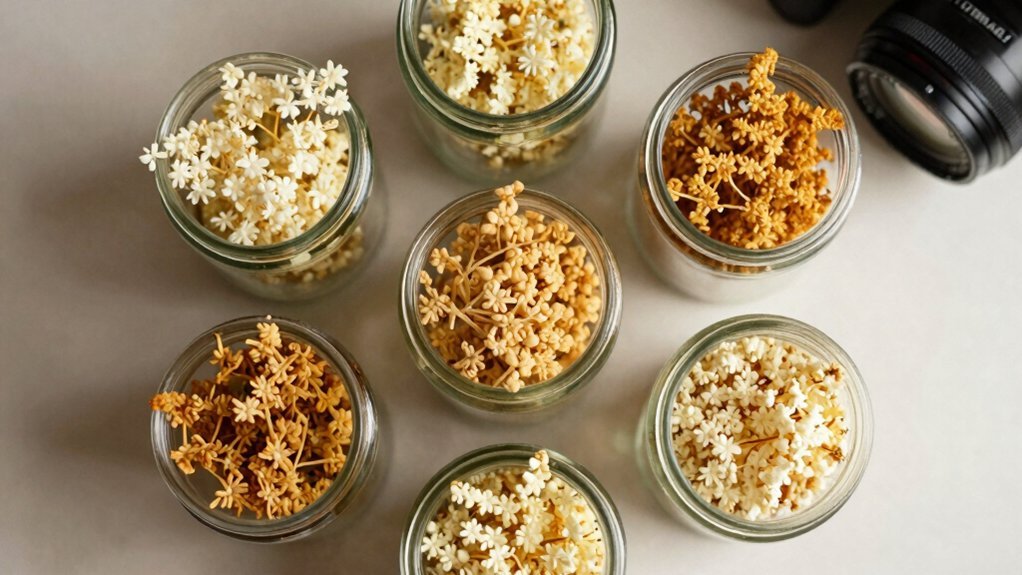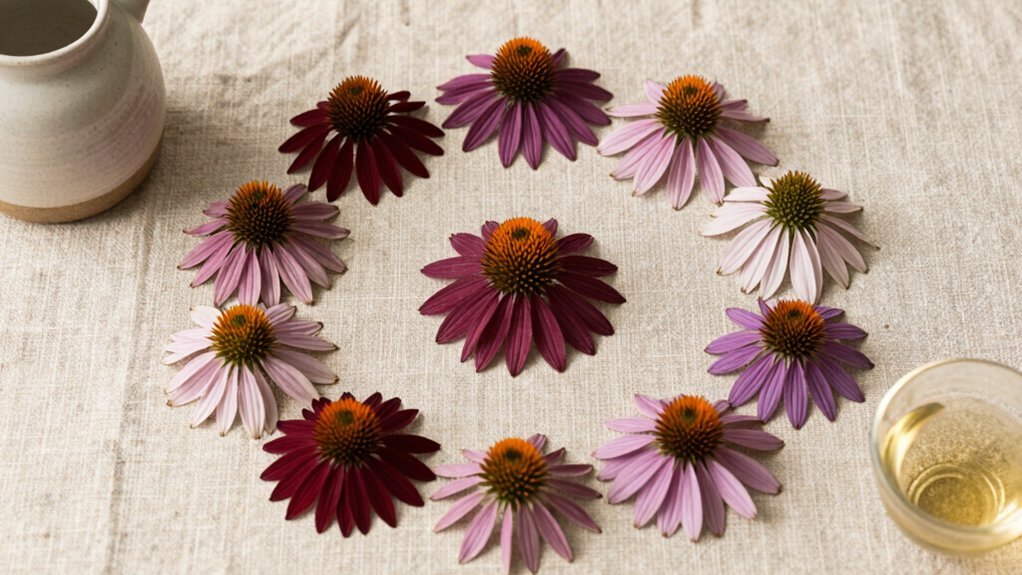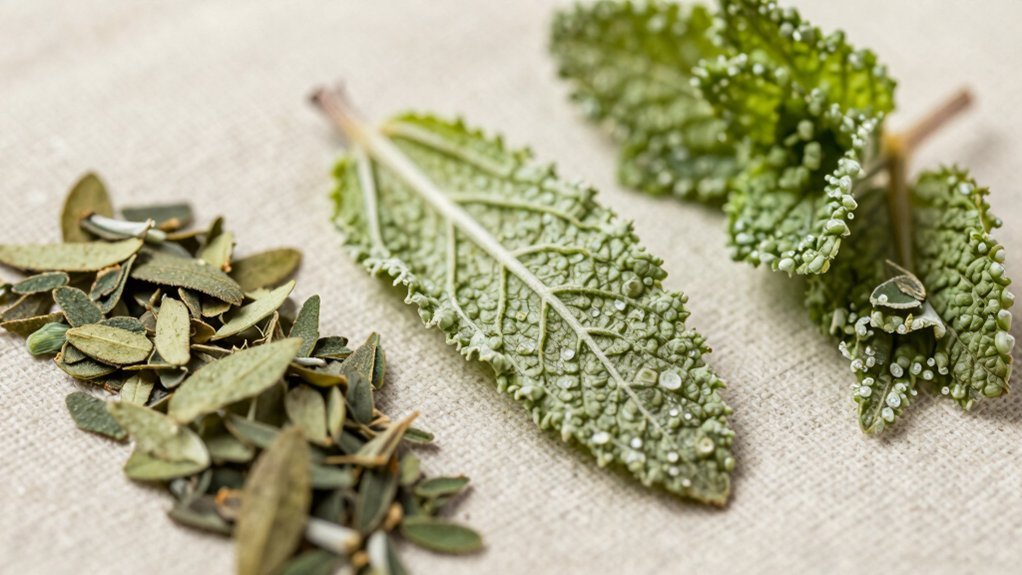If you're ready to start your DIY tea-making journey, selecting the right herb seed collection can make all the difference between success and frustration. You'll find countless options online, but not all seed collections deliver the quality and variety needed for creating flavorful, beneficial brews. From compact 12-variety packs to extensive 36-herb collections, each option offers unique advantages for budding herb gardeners. Let's explore the top five collections that'll set you up for tea-making success.
Medicinal & Herbal Tea Seeds Variety Pack (15 Types)
Whether you're a tea enthusiast or aspiring herbalist, this 15-variety medicinal herb seed collection offers everything needed to start your own tea garden. You'll receive 2,950+ non-GMO heirloom seeds, including popular varieties like Chamomile, Lavender, and Echinacea, all with a 90%+ germination rate.
Each variety comes in waterproof resealable bags with plant markers and step-by-step growing guides accessible via QR codes. You can grow these herbs indoors, outdoors, or in a greenhouse, making it easy to maintain a year-round supply. The seeds are USA-crafted and tested for freshness, with a two-year guarantee. You'll also get access to online recipes for creating your own tea blends.
Best For: Gardening enthusiasts, tea lovers, and herbalism beginners looking to grow their own medicinal herbs and create custom tea blends while experiencing the satisfaction of sustainable gardening.
Pros:
- Comprehensive variety pack with 15 different medicinal and tea herbs, including popular varieties like Chamomile and Lavender
- High-quality packaging with resealable bags, plant markers, and QR-code accessible growing guides make it beginner-friendly
- Excellent germination rate (90%+) with non-GMO heirloom seeds and 2-year freshness guarantee
Cons:
- Requires dedicated time and patience as plants need regular maintenance and take time to mature
- Some varieties may be challenging to grow in certain climates or indoor conditions
- Initial setup costs for proper growing equipment and soil can add to the overall investment
Ultimate Medicinal Herbs Collection – 36 Variety Pack for Growing
For gardeners seeking complete medicinal herb self-sufficiency, the Ultimate Medicinal Herbs Collection offers an extensive 36-variety pack of non-GMO heirloom seeds. You'll find everything needed to create your own healing garden, whether indoors or outdoors.
What sets this collection apart is its versatility. You can use these herbs from leaf to flower to root, crafting teas, essential oils, tinctures, and salves. The seeds are open-pollinated and carefully selected for high germination rates, staying viable for years when properly stored.
With a 4.5-star rating from over 500 reviews, this collection's success rate and responsive customer service make it an excellent choice for both beginners and experienced herbalists.
Best For: Homesteaders, herbalists, and gardening enthusiasts looking to establish a comprehensive medicinal herb garden with heirloom varieties for natural remedies and self-sufficiency.
Pros:
- Extensive variety of 36 different medicinal herbs provides excellent value and diverse healing options
- High-quality, non-GMO heirloom seeds with proven germination rates and long-term viability
- Includes detailed growing instructions and can be used in multiple ways (teas, oils, tinctures)
Cons:
- May be overwhelming for complete beginners due to the large variety of herbs to manage
- Some customers report occasional missing seed packets in their orders
- Requires significant space or multiple growing seasons to cultivate all 36 varieties simultaneously
35 Medicinal & Tea Herb Seeds Variety Pack (Non-GMO Heirloom Seeds)
Tea enthusiasts seeking an extensive growing experience will find exceptional value in this 35-variety medicinal and tea herb seed collection. With over 16,335 non-GMO heirloom seeds, you'll discover classics like Italian Basil alongside unique varieties like Bergamot and Borage.
You'll appreciate the user-friendly approach, including resealable packets with QR codes linking to growing guides. Whether you're planning an indoor hydroponic setup or outdoor garden, these USA-made seeds boast high germination rates and can last up to three years when stored properly. While some customers noted minor packaging issues, the collection's 4.4-star rating reflects its quality and versatility as both a practical investment and thoughtful gift option.
Best For: Tea and herb enthusiasts who want to grow their own organic medicinal plants, whether they're experienced gardeners or beginners looking to start their first herb garden.
Pros:
- Extensive variety with over 16,335 non-GMO heirloom seeds across 35 different herb types
- User-friendly packaging with QR codes linking to detailed growing instructions
- Versatile growing options suitable for both indoor hydroponics and outdoor gardens
Cons:
- Some customers report issues with packet design and seeds falling out
- Requires regular maintenance and proper growing conditions for optimal results
- Seeds may not last beyond 3 years even with proper storage
Medicinal Herbs and Herbal Tea Garden Seed Collection (25 Varieties)
Passionate herb gardeners will find exceptional value in this extensive 25-variety medicinal herb collection, which boasts a remarkable 96% germination rate. You'll receive non-GMO, heirloom seeds grown and packed in the USA, including popular varieties like Lavender, Chamomile, and multiple Basil types.
Each packet contains generous quantities, from 550 Italian Basil seeds to 50 Rosemary seeds, with QR-coded growing guides for best results. Whether you're planting indoors or outdoors, these seeds work well in traditional gardens and hydroponic systems. You can expect germination within 4-21 days and harvests up to 30 weeks, making this collection perfect for year-round herb and tea cultivation.
Best For: Gardening enthusiasts and herbal tea lovers looking to grow a diverse collection of medicinal and culinary herbs, whether they're beginners or experienced growers with indoor or outdoor growing space.
Pros:
- Exceptional variety with 25 different herb types and generous seed quantities for each variety
- High-quality, non-GMO heirloom seeds with a 96% germination rate and detailed growing instructions
- Versatile growing options suitable for both indoor and outdoor cultivation, including hydroponic systems
Cons:
- Some varieties like Rosemary and Sage have relatively low seed quantities (50 seeds each)
- Variable germination times (4-21 days) may require careful planning and patience
- Some customers report challenges with certain varieties not sprouting, despite the high overall germination rate
Seed Needs Culinary Herb Seeds Variety Pack (12 Packets)
Green thumbs seeking an all-inclusive herb garden starter kit will find the Seed Needs Culinary Herb Seeds Variety Pack an ideal choice. With 12 non-GMO, heirloom varieties, you'll get essential herbs like basil, oregano, and rosemary that work beautifully in both teas and cooking.
You can grow these versatile herbs indoors or outdoors, using traditional soil or hydroponic setups. Each packet comes with clear planting instructions and generous seed quantities. The herbs' dual-purpose nature lets you explore both culinary and medicinal benefits, while the temperature-controlled storage guarantees high germination rates. Whether you're starting a tea garden or expanding your existing collection, these herbs offer sustainable, fresh ingredients at your fingertips.
Best For: Home gardeners and cooking enthusiasts looking to grow a diverse collection of culinary and medicinal herbs from high-quality, non-GMO seeds in either indoor or outdoor settings.
Pros:
- Comprehensive variety pack of 12 popular herb varieties with both culinary and medicinal applications
- High-quality heirloom seeds suitable for both traditional soil and hydroponic growing methods
- Detailed planting instructions and temperature-controlled storage ensure high germination rates
Cons:
- Some slower-growing varieties like rosemary may require extra patience and care
- Requires dedicated space and proper growing conditions for all 12 varieties
- May be overwhelming for absolute beginners who might prefer starting with fewer varieties
Factors to Consider When Choosing an Herb Seed Collection for DIY Tea Making
When you're selecting an herb seed collection for your tea garden, you'll want to focus on herbs that thrive in your specific growing environment and have high germination success rates. You'll need to guarantee proper seed storage conditions to maintain seed viability, keeping them in a cool, dry place until planting time. Consider which medicinal properties you're seeking in your tea, as different herb varieties offer distinct benefits, from chamomile's calming effects to peppermint's digestive support.
Herb Variety Selection
Selecting the right herb varieties for your tea-making journey requires careful consideration of both flavor profiles and growing requirements. You'll want to start with versatile herbs like chamomile, which offers calming properties, and peppermint, known for supporting digestive health. Include lavender, lemon balm, and thyme to create diverse flavor combinations and unique blends.
Look for non-GMO heirloom seed varieties in your collection, as they'll provide you with better-tasting herbs and the ability to save seeds for future growing seasons. When reviewing seed options, prioritize collections with high germination rates of 90% or above to guarantee successful growth. Many quality collections now come with detailed growing guides and QR codes, giving you instant access to planting instructions and care tips for each herb variety.
Growing Environment Requirements
The success of your tea herb garden starts with understanding the proper growing conditions each plant needs to thrive. Most tea herbs require 6-8 hours of direct sunlight daily, though you'll find some varieties like thyme can manage with partial shade. If you're growing indoors, you'll need to supplement with grow lights during darker months.
Your soil choice matters greatly. Select a well-draining loamy mix or quality potting soil that retains moisture without becoming waterlogged. Whether you're using traditional containers or exploring hydroponic systems, proper water management is vital. You'll want to maintain consistent moisture while allowing periodic drying between waterings to prevent root rot. Hydroponic setups offer an efficient alternative for indoor growing, providing precise control over water and nutrients while maximizing limited space.
Germination Success Rates
Since successful tea gardens begin with viable seeds, understanding germination rates becomes a critical factor in choosing your herb seed collection. You'll want to select seed packages that boast germination rates of 96% or higher, ensuring reliable yields and minimizing the need for replanting.
When evaluating seed collections, look for packages with detailed germination instructions and QR codes linking to online guides. These resources will help you maximize your success rate. Choose heirloom and non-GMO seeds, as they're specifically bred for resilience and superior germination performance. To maintain high germination rates across multiple growing seasons, store your seeds in a cool, dry place. Quality seeds can remain viable for up to three years when properly stored, giving you flexibility in your planting schedule and better value for your investment.
Seed Storage Conditions
When choosing herb seed collections for your tea garden, proper storage conditions play an essential role in maintaining seed viability. You'll want to assess how the seeds have been stored before purchase and prepare an appropriate storage space at home. Keep your seeds in a cool environment between 32°F to 50°F, away from direct light to preserve their germination potential.
Select collections that come in airtight containers or resealable bags, as these protect against moisture and pests. If your seeds aren't packaged this way, transfer them to suitable containers immediately. Don't forget to label each package with the purchase date, as most herb seeds remain viable for 2-3 years. Regular checking of your stored seeds will help you track their age and use older ones first, ensuring nothing goes to waste in your tea garden planning.
Medicinal Properties Available
Understanding medicinal properties should guide your herb seed collection choices, as different plants offer unique health benefits for tea making. You'll find Echinacea seeds particularly valuable for immune support during seasonal changes, while chamomile seeds can help you grow herbs for calming teas that reduce anxiety and promote better sleep.
Consider including rosemary in your collection for its antimicrobial benefits, which you can use both for preserving food and brewing health-supporting teas. Thyme's antiseptic qualities make it an excellent choice for respiratory support, and you'll want to add it to your therapeutic tea blends. Don't overlook lavender seeds, as they'll provide you with herbs that can help manage stress and improve your mood when brewed into a soothing tea.
Seasonal Growing Patterns
As you plan your herb seed collection for tea making, you'll need to contemplate the distinct growing patterns of different herb varieties. Understanding these patterns will guarantee you'll have fresh ingredients available when you want them.
You can count on perennial herbs like lavender and thyme to provide tea ingredients year after year without replanting. Annual herbs such as chamomile and basil offer quick results within a single season, while biennials like parsley require two seasons to reach full maturity. Consider mixing these different types to maintain a continuous supply throughout the year.
Pay attention to germination times, which can range from 4 to 30 days depending on the herb variety. By carefully planning your planting schedule around these timeframes, you'll create a sustainable rotation of fresh herbs for your tea-making endeavors.
Packaging Quality Assessment
The quality of seed packaging plays an essential role in preserving your herb collection's viability for tea making. When selecting your herb seed collection, you'll want to look for resealable bags that protect against moisture and maintain freshness. Individual seed packets within the collection aren't just convenient – they'll help you stay organized and prevent accidental mixing of different herbs.
Pay attention to packaging that features QR codes or links to online growing resources, as they'll provide valuable guidance for your gardening journey. Sturdy packaging materials guarantee your seeds arrive undamaged and remain viable during storage. Don't forget to check for clear, detailed labeling on each packet, which should include the herb variety, planting depth, and spacing requirements. These details will make your tea garden planning and planting process much more straightforward.
Cultivation Support Resources
Successful herb gardening for tea making relies heavily on having access to extensive growing resources and support. When selecting your seed collection, look for packages that feature QR codes linking to thorough online growing guides. These digital resources provide you with essential step-by-step instructions for ideal plant care.
You'll want to choose collections that offer detailed information about soil requirements, watering schedules, and sunlight needs. The best seed packets include specific harvesting guidelines and tea-making instructions, making your journey from seed to cup straightforward. Additionally, check that your chosen collection guarantees high germination rates of 90% or above. If you're interested in exploring different growing methods, select varieties that work well in both traditional gardens and hydroponic systems, giving you flexibility in your cultivation approach.
Frequently Asked Questions
How Long Do Dried Homegrown Tea Herbs Stay Fresh in Storage?
You'll find your dried tea herbs stay fresh for 6-12 months when stored in airtight containers away from light, heat, and moisture. For best flavor, use them within the first 6 months after drying.
Can I Grow Tea Herbs Indoors All Year Round?
Yes, you can grow most tea herbs indoors year-round with proper lighting, containers, and care. You'll need south-facing windows or grow lights, well-draining soil, and good air circulation for successful indoor cultivation.
Which Herbs Should Not Be Mixed Together in Tea Blends?
You shouldn't mix peppermint with chamomile as it'll overpower the flavor. Also, avoid combining St. John's Wort with other herbs, as it can interact with medications and herbs like valerian root.
Do Herbal Tea Seeds Need to Be Stratified Before Planting?
You'll need to stratify some tea herbs like echinacea, chamomile, and lavender, but others like mint, lemon balm, and sage don't require it. Check each seed variety's specific requirements before planting.
Are There Specific Herbs That Shouldn't Be Consumed During Pregnancy?
You shouldn't consume herbs like sage, parsley, rosemary, and peppermint during pregnancy. It's best to consult your healthcare provider before drinking any herbal teas, as some can affect pregnancy hormones.





Leave a Reply